

Worker, Interrupted: The Cost of Task Switching. Why study interruption?
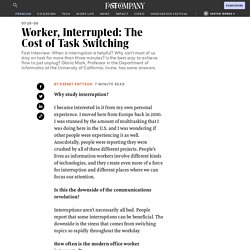
I became interested in it from my own personal experience. I moved here from Europe back in 2000. The Hidden Costs Of Interruptions At Work. Paul Modley was given the challenge of a lifetime when the talent recruiter was asked to help hire 9,000 paid staff on behalf of the London Organizing Committee for the 2012 Olympic and Paralympic Games.
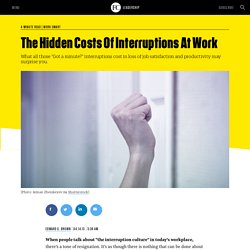
If the sheer volume and time constraint weren’t enough of a challenge, finding staff for the Olympics included some additional requirements, such as local hiring quotas and diversity goals, during a run-up to the games that saw widespread rioting and negative press. Mental health issues: Manage performance, not people. Employers must maintain a clear distinction between managing people and managing their performance, particularly when mental illness could be involved, a workplace lawyer warns.
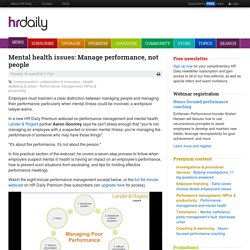
In a new HR Daily Premium webcast on performance management and mental health, Lander & Rogers partner Aaron Goonrey says he can't stress enough that "you're not managing an employee with a suspected or known mental illness, you're managing the performance of someone who may have those things". "It's about the performance, it's not about the person. " In this practical section of the webcast, he covers a seven-step process to follow when employers suspect mental ill health is having an impact on an employee's performance, how to prevent such situations from escalating, and tips for holding effective performance meetings.
Watch the eight-minute performance management excerpt below, or the full 84-minute webcast on HR Daily Premium (free subscribers can upgrade here for access). Mindfulness is key to balanced conversations for leaders. Sign Up. Oxford Mindfulness Centre » Is mindfulness safe? The practice of mindfulness has many benefits; how can we ensure it is safe?
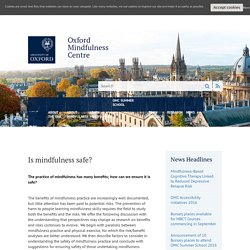
The benefits of mindfulness practice are increasingly well documented, but little attention has been paid to potential risks. The prevention of harm to people learning mindfulness skills requires the field to study both the benefits and the risks. We offer the following discussion with the understanding that perspectives may change as research on benefits and risks continues to evolve.
We begin with parallels between mindfulness practice and physical exercise, for which the risk/benefit analyses are better understood. CLASSIC and FAMOUS SAFETY QUOTES. “Essentially what we’re doing is we’re drawing upon the ghosts of disaster past and spectres of disaster future and we’re using it to justify the bureaucracy we want to put into the present.”JAMES REASON’S 4 SAFETY PARADOX’s(1) Safety is defined and measured more by its absence than its presence.(2) Defences, barriers and safeguards not only protect a system, they can also cause its catastrophic breakdown.(3) Many organisations seek to limit the variability of human action, primarily to minimise error, but it is this same variability – in the form of timely adjustments to unexpected events – that maintains safety in a dynamic and changing world.(4) An unquestioning belief in the attainability of absolute safety can seriously impede the achievement of realisable safety goals, while a preoccupation with failure can lead to high reliability.Famous Safety QuotesFrom www.quotegarden.com:Out of this nettle, danger, we pluck this flower, safety.
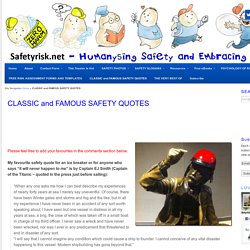
Theconversation. One of our most persistent psychological myths is that what doesn’t kill us makes us stronger.
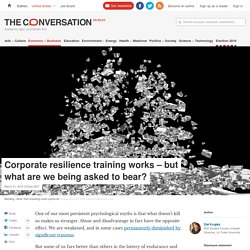
Abuse and disadvantage in fact have the opposite effect. We are weakened, and in some cases permanently diminished by significant traumas. But some of us fare better than others in the lottery of endurance and renewal, and employers have recently set their sights on how to train us to be more competitive in the challenge of rolling with life’s punches. Companies including NAB, BP and Royal Dutch Shell are now offering “resilience training” to their employees, and in line with recent studies of similar programs across a number of companies, it appears to be working. Mental health in the workplace - worksafe.qld.gov.au. 04 Feb 2016 The health of workers is not just about physical health, but psychological health too.
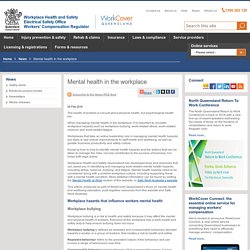
When managing mental health in the workplace, it is important to consider workplace hazards such as workplace bullying, work-related stress, work-related violence and work-related fatigue. Workplaces that take an active leadership role in managing mental health hazards are likely to see overall improvements to staff health and wellbeing, as well as greater business productivity and safety culture. Knowing how to how to identify mental health hazards and the actions that can be taken to manage the risks, not only contributes to the success of business, but helps fulfil legal duties. Occupational suicide – the dark side to Australia’s workforce. Australia’s workforce is in the throes of a dark and deadly suicide scourge, prompting employers to take urgent steps to address their workplace mental health.
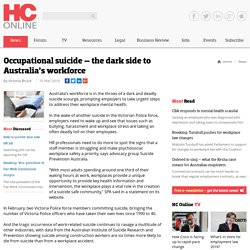
In the wake of another suicide in the Victorian Police force, employers need to wake up and see that issues such as bullying, harassment and workplace stress are taking an often deadly toll on their employees. HR professionals need to do more to spot the signs that a staff member is struggling and make psychosocial workplace safety a priority, says advocacy group Suicide Prevention Australia. “With most adults spending around one third of their waking hours at work, workplaces provide a unique opportunity to provide key health information and intervention, the workplace plays a vital role in the creation of a suicide safe community,” SPA said in a statement on its website.
MindWell Canada. MindWell Canada. Corporate Wellness Magazine The Myths Surrounding Bullying and Harassment in the Workplace. Bullying: What are the Myths Surrounding Bullying and Harassment in the Workplace?
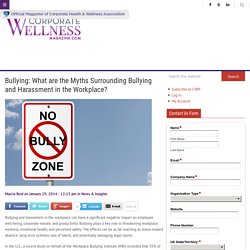
Marcia Reid on January 29, 2014 - 12:15 pm in News & Insights Bullying and harassment in the workplace can have a significant negative impact on employee well-being, corporate morale, and productivity. Bullying plays a key role in threatening workplace wellness, emotional health, and perceived safety. The effects can be as far reaching as stress-related absence, long term sickness, loss of talent, and potentially damaging legal claims.
In the U.S., a recent study on behalf of the Workplace Bullying Institute (WBI) recorded that 35% of employees had experienced bullying. There continues to be many misconceptions regarding this emotive subject. Mindfulness in the workplace: have we had a gutful? The news from the home of mindfulness – that's California, not the exotic east – is grim.
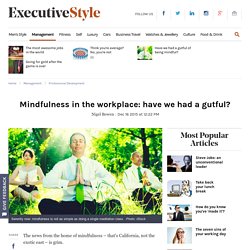
Both erstwhile true believers and long-time sceptics have begun questioning whether corporate mindfulness programs are unarguably A Good Thing. In the US, think pieces about the mindfulness backlash are now appearing in the same publications that five minutes ago were breathlessly reporting on widespread calm, concentration, co-operation and lunchtime positive visualisation classes springing up at multi-nationals. We're not surprised half our psychologist colleagues are depressed. Mental health in the workplace. We're not surprised half our psychologist colleagues are depressed. Four factors that influence resilience in the workplace. Individuals A resilient individual is someone who maintains good mental health and productivity generally, as well as during times of stress or adversity. Skills in emotional regulation, awareness of when to ask for help, self-esteem, confidence in individual ability and problem focussed coping skills are protective factors that may boost individual resilience.
Stressful life events, a mismatch between skills and the job, prior mental ill health as well as chronic health problems and a low perception of their own health, are risk factors that may reduce individual resilience. Practical strategies to build individual resilience Individual resilience training grounded in evidence based approaches, for example Cognitive Behavioural Training or Mindfulness/Acceptance and Commitment Therapy.
Research results—Resilience impacting on return to work at the individual level Comcare’s recent injured worker survey produced a number of interesting findings in relation to resilience: Individual jobs Teams. Compassion fatigue: the cost some workers pay for caring. Health and social workers often choose their profession because they want to help people. But seeing trauma and suffering on a regular basis can have a deep impact on these workers. “Compassion fatigue” is a response to the stress of caring for people at times of crisis and is often referred to as the cost of caring. Researchers first identified compassion fatigue in the 1970s when they recognised certain psychological symptoms among health care and social service workers.
The term “compassion fatigue” was coined in the early 1990s to describe nurses who worked in emergency care and were experiencing symptoms similar to burnout. Compassion fatigue is now defined as a “combination of physical, emotional, and spiritual depletion associated with caring for people in significant emotional pain and physical distress”.
Theconversation. We experience rudeness and incivility all the time. From simple insults and offhand remarks to purposely excluding others from groups, these behaviors are largely tolerated in our daily lives and in the workplace. The question is, what effect do these behaviors have on us? Theconversation. Hunched over, hardly moving for hours on end, hitting the same buttons again and again in the hope of a future reward … sound familiar? The Amygdala Is NOT the Brain's Fear Center. Resilience Training Company. What motivates us at work? More than money. Case Study: How does Optus manage Psychological H&S? - Peoplecorp. How Your Boss Affects your Health and Relationships - Cesar Gamio.
According to the latest “Time-Use studies,” which provide information about how people spend their time, who they spend it with and how they feel at various points throughout the day, one major finding from this research is that, for most people, the person they least enjoy being around is their boss!